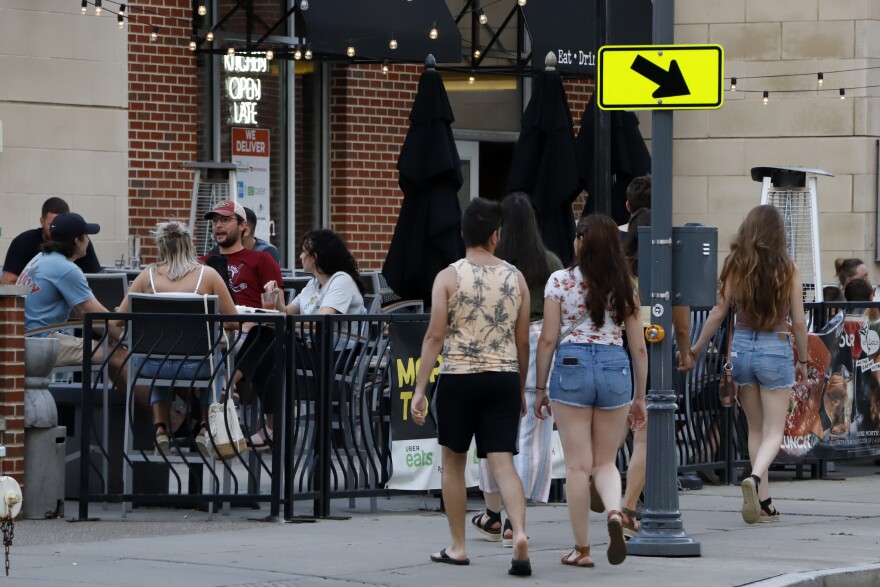On today's program: As Allegheny County is experiencing an increase in COVID-19 cases, officials are trying to slow the pandemic; an update on the U.S. Supreme Court’s latest rulings and a preview of what’s to come; and new legislation regarding Pennsylvania’s DUI laws could mean big changes for medical cannabis patients.
Despite surge in COVID cases, Fitzgerald doesn't believe area will return to Yellow Phase
(00:00 — 8:09)
For the last two weeks, Allegheny County has been experiencing a surge in COVID-19 cases, with multiple daystopping 200 new cases. Allegheny County ExecutiveRich Fitzgerald says that although the county is still in the green phase, people cannot return to “life as normal” just yet.
“We did see a lot of young people that went into bars, didn’t socially distance, didn’t wear masks, didn’t do all the things that [Health Department Director] Dr. Bogan and our medical experts have been advising and we saw a spike in cases,” he says. “We went from one of the lowest in the state in the number of cases to one of the highest in a very short period of time.”
Despite more than 1,000 new cases in the past week, Fitzgerald says he doesn’t expect the county to return to the yellow phase of shutdown.
“I think as time goes on, we’re going to always see certain things open up, certain things close down, certain things be changed, and I think that’s really going to come into effect when we start school back in the fall.”
Fitzgerald says the county is exploring the options they have to enforce the health department’s guidelines on the indoor dining ban and mandatory mask policy.
"We may be using some county police, local police, building inspectors—you know, who knows? And some things the industry themselves are going to have to be part of that as well,” he tells The Confluence. “And I know that’s not easy, to turn in your own folks if they’re doing bad things, but we don’t want everybody to be shut down for a very long period of time if we don’t have to.”
He says the number of cases have been much higher than "any of us feel comfortable with. “We don’t want to turn into Texas, Arizona, Florida, California, where they’re seeing huge spikes go on. We’re not there yet and we don’t want to be there.”
SCOTUS rulings chip away at birth control and the Affordable Care Act
(8:11 — 13:17)
Two Pennsylvania cases surrounding free contraception coverage for employees took center stage as the U.S.Supreme Court wrapped up its session for the summer.
By a 7-2 vote in the cases of Little Sisters of the Poor v. Pennsylvania and Trump v. Pennsylvania, the justices ruled that employers have the right to refuse to provide free birth control coverage to workers based on religious or moral objections.
University of Pittsburgh law professor and WESA legal analyst David Harris says the Affordable Care Act made contraception free for anyone receiving health insurance but also created an exemption for religious organizations.
“They didn’t want anything to do with the federal government supplying any of the services through funding; so they objected and sued,” Harris says.
The Supreme Court ruled that President Trump had the authority to expand the exemptions beyond religious organizations to include other employers who objected to birth control insurance.
Harris says he was not surprised by the ruling “because thematically the court has been moving in this direction over a whole host of different kinds of issues,” he says. “What you see overall is the court using the religion clauses in the first amendment to justify a greater exercise of religious rights of other people.”
Planned Parenthood of Western Pennsylvania issued a statement calling the decision a major step backward for reproductive rights “undermining decades of work toward gender equity and contributing to the unacceptable disparity in health care access that exists in our country.
According to Harris, these rulings carve away a portion of the Affordable Care Act, but in the fall the justices will take up a case that seeks to strike down the entire act.
Proposed legislation could change DUI laws for medical marijuana patients
(13:20 — 18:02)
Pennsylvania’s DUI laws punish people who drive under the influence. DUI convictions carry serious penalties in Pennsylvania, including loss of license, insurance hikes or cancellations, plus fines and jail time for some multiple offenders. But patients who use medical cannabis—a legal drug that does not impair driving ability when used in prescription dosages—are facing the same penalties as people who drive drunk.
New legislation could change Pennsylvania’s DUI laws to require proof of impairment, which could help patients using non-intoxicating doses of medical cannabis.
“When we passed medicinal cannabis use as being legal, we didn’t address this catch that is in the legislation. And we need to correct that,” saysSenator Camera Bartolotta, the bill's sponsor.
Bartolotta says that if a person is impaired behind the wheel, the DUI laws still apply. “This in no way, shape, or form allows people to drive impaired,” she says. “That is not what this does.”
According to Bartolotta, the bill has the support of the Pennsylvania District Attorneys Association, as well as other Pennsylvania attorneys and medical marijuana patients.
“This is an unintended consequence and it should be corrected,” she says.
The Confluence, where the news comes together, is 90.5 WESA’s daily news program. Tune in weekdays at 9 a.m. to hear newsmakers and innovators take an in-depth look at stories important to the Pittsburgh region. Find more episodes of The Confluence here or wherever you get your podcasts.






